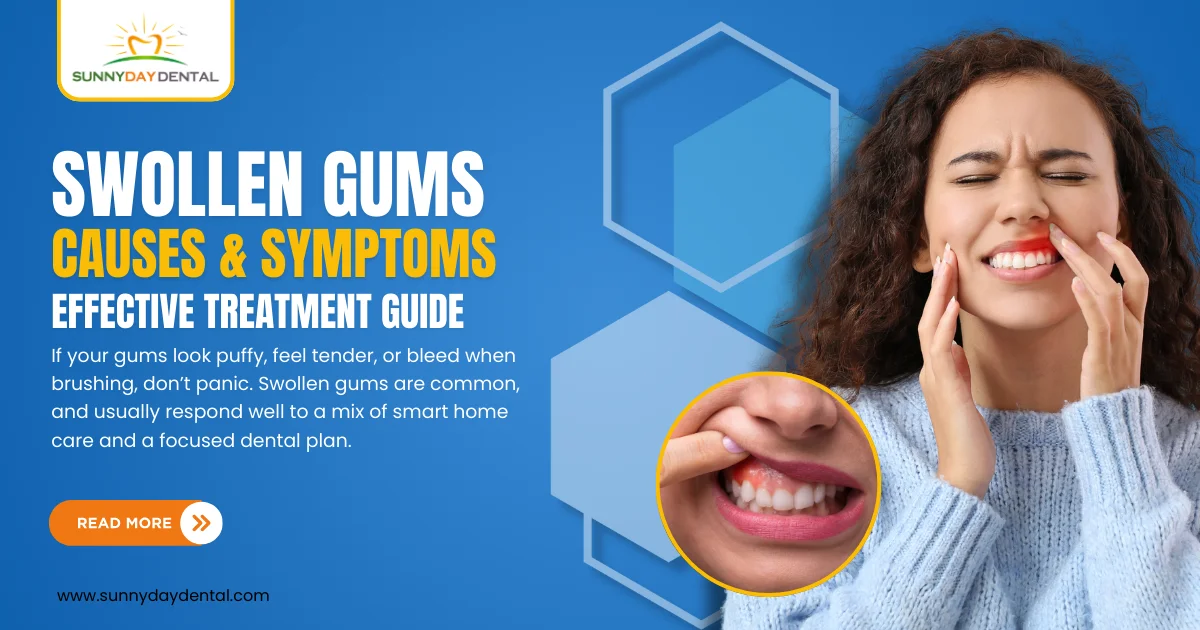If your gums look puffy, feel tender, or bleed when brushing, don’t panic. Swollen gums are common, and usually respond well to a mix of smart home care and a focused dental plan. This guide explains the likely causes, what you can try today, and when to book professional swollen gums treatment with a dentist for swollen gums in Woodbridge.
Table of Contents
ToggleQuick Tips to Identify Gum Problems
When gums swell, your mouth is sending a clear signal: something needs attention. Catching the cause early keeps minor irritation from snowballing into bigger problems.
- Most Common Trigger: Plaque at the gumline, causing early inflammation
- Other Triggers: Hormonal shifts, mouth breathing/dryness, rough brushing, ill-fitting crowns or dentures
- Act Now If: Swelling lasts beyond a week, bleeding is frequent, there’s a bad taste, or one spot throbs
- Urgent: Facial swelling, fever, or pus may require assessment for oral surgery in Woodbridge if an abscess is present
Use these quick signals to decide what you can do at home and what needs a professional eye. If symptoms linger beyond a week, it’s time to get help.
8 Reasons Why Gums Puff Up: The Usual Suspects
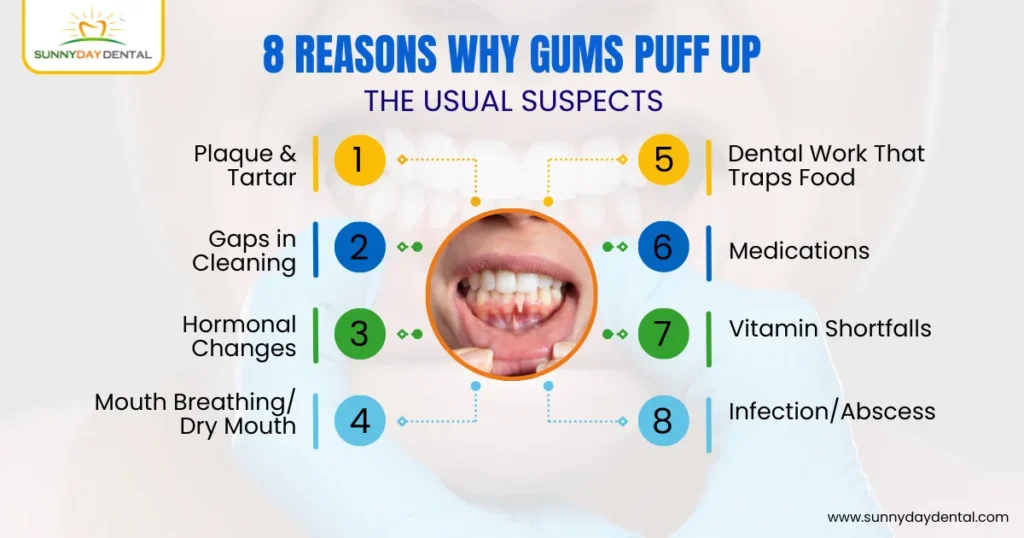
Swelling is a symptom, not a diagnosis. From sticky plaque to hormone shifts, several culprits can inflame your gumline.
- Plaque & Tartar: Film at the gumline irritates tissues; hardened tartar amplifies inflammation.
- Gaps in Cleaning: Skipping interdental cleaning leaves bacteria between teeth.
- Hormonal Changes: Pregnancy, puberty, and menopause can heighten gum response.
- Mouth Breathing/Dry Mouth: Less saliva means less natural cleaning.
- Dental Work That Traps Food: Overhanging fillings, ill-fitting crowns, or dentures inflame one area.
- Medications: Some blood pressure and other medications can enlarge gums.
- Vitamin Shortfalls: Low vitamin C can worsen swelling.
- Infection/Abscess: A Deep cavity or gum pocket causes one-sided pain and swelling.
Pinpointing the “why” makes treatment faster and more effective. Once we identify the trigger, swelling typically settles quickly.
Home Fixes that Actually Soothe
A few simple habits can calm irritated tissue and restore comfort. Think gentle cleaning, smart rinses, and hydration, not harsh scrubbing.
- Brush Gently, Twice Daily: Soft brush, two minutes, bristles angled toward the gumline.
- Clean Between Teeth Daily: Floss or interdental brushes—whichever you’ll stick with.
- Warm Salt-Water Rinse: Soothing support once or twice a day.
- Hydrate & Snack Smart: More water, fewer frequent sugary snacks.
- Don’t Avoid Bleeding Areas: Clean them gently; bleeding is a sign of irritation, not a reason to stop.
Give these changes a consistent week to work. If your gum surgery still feel puffy or tender, book a checkup so we can dig deeper.
6 In-Clinic Treatment for Swollen Gums: What We Do
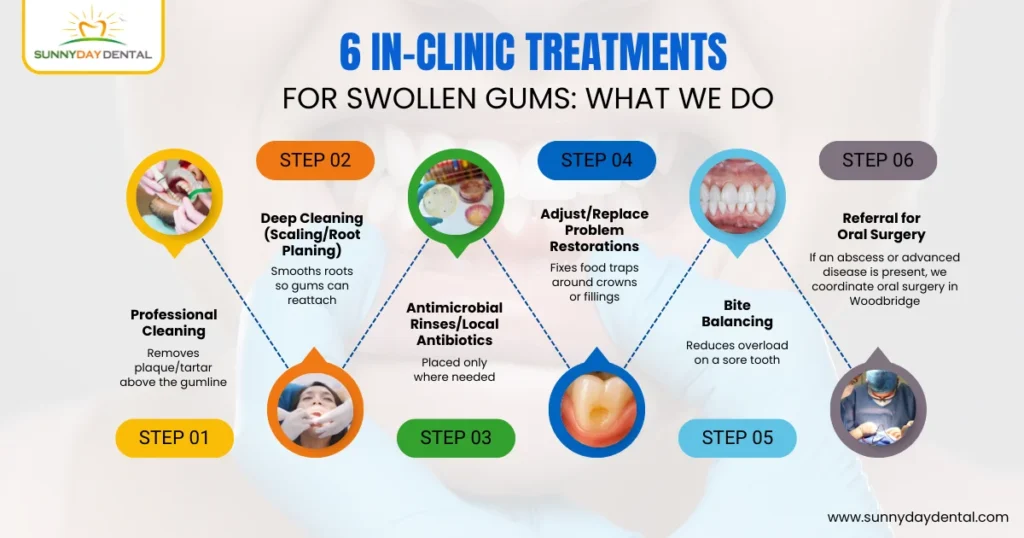
When home care isn’t enough, targeted dental treatment clears the root cause. We combine precision cleaning with small adjustments that make a big difference.
- Professional Cleaning: Removes plaque/tartar above the gumline.
- Deep Cleaning (Scaling/Root Planing): Smooths roots so gums can reattach.
- Antimicrobial Rinses/Local Antibiotics: Placed only where needed.
- Adjust/Replace Problem Restorations: Fixes food traps around crowns or fillings.
- Bite Balancing: Reduces overload on a sore tooth.
- Referral for Oral Surgery: If an abscess or advanced disease is present, we coordinate oral surgery in Woodbridge.
The goal is simple: reduce inflammation, protect the tissues, and prevent a relapse. You’ll leave with a plan that fits your mouth and your routine.
Red-Flag Symptoms for Gum Problems: When to Call Same-Day
Some signs mean “don’t wait.” Spreading swelling, fever, or a bad taste can point to infection.
- Swelling that spreads to the face or jaw
- Fever, difficulty swallowing, or pus
- Severe, throbbing pain in one area
Quick treatment here protects teeth and bone—and eases pain fast. If you notice these red flags, contact us the same day.
6 Dentist-Approved Tips to Prevent Gum Problems
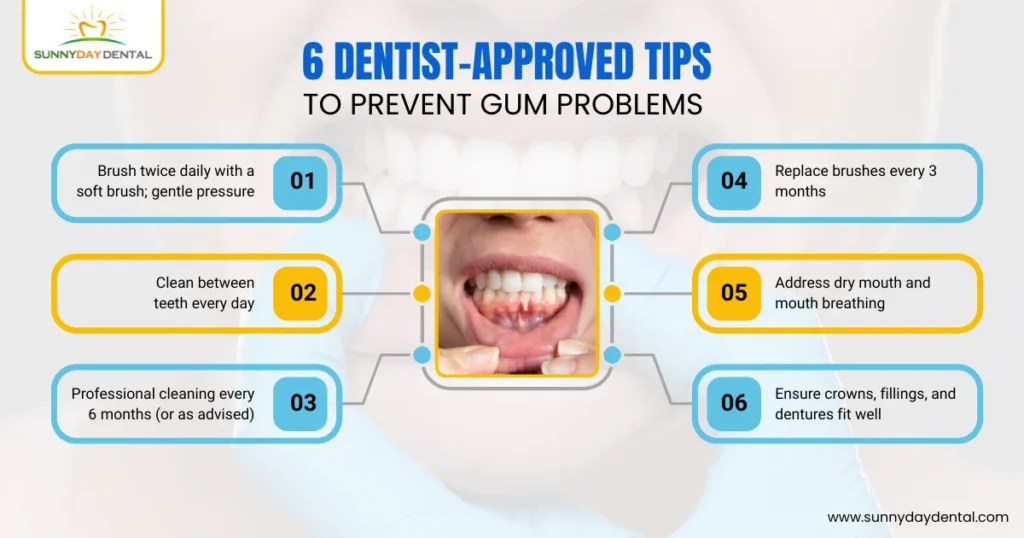
Healthy gums are a daily habit, not a mystery. Small, repeatable steps keep plaque in check and tissues resilient.
- Brush twice daily with a soft brush; gentle pressure
- Clean between teeth every day
- Professional cleaning every 6 months (or as advised)
- Replace brushes every 3 months
- Address dry mouth and mouth breathing
- Ensure crowns, fillings, and dentures fit well
Mark your calendar for regular cleanings and swap worn brushes on schedule. Prevention is the easiest way to keep your smile comfortable.
Your Next Step with Sunny Day Dental
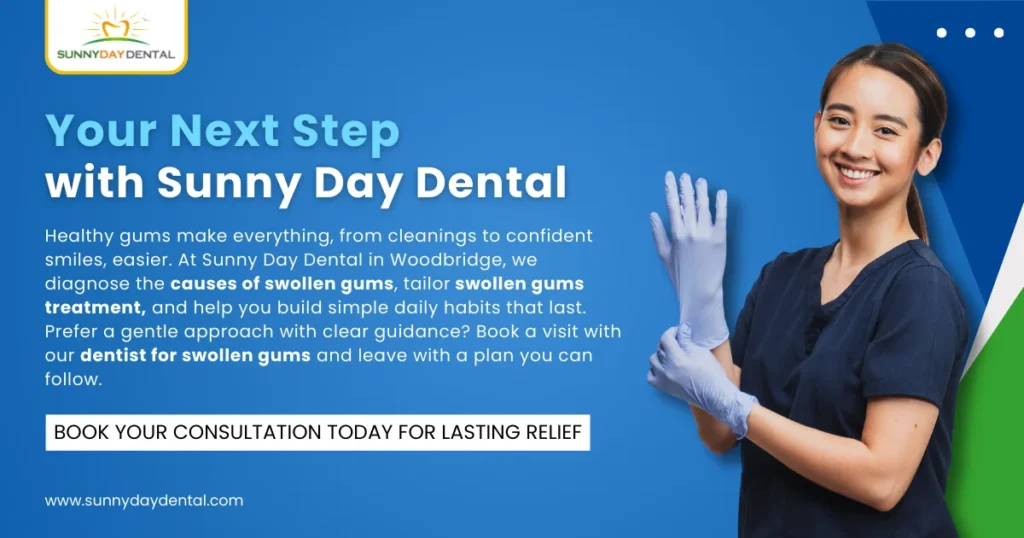
Healthy gums make everything, from cleanings to confident smiles, easier. At Sunny Day Dental in Woodbridge, we diagnose the causes of swollen gums, tailor swollen gums treatment, and help you build simple daily habits that last. Prefer a gentle approach with clear guidance? Book a visit with our dentist for swollen gums and leave with a plan you can follow.
FAQs for Swollen Gums
1) Why Are My Gums Swollen Around One Tooth?
Often, a food trap, tartar, or a rough edge on a filling or crown is to blame. A focused cleaning and fixing of the trap usually resolves swollen gums quickly.
2) Can Swollen Gums Go Away On their Own?
Mild irritation may improve with better cleaning, but persistent swelling needs an exam to rule out deeper pockets or infection.
3) Do I Need Antibiotics for Swollen Gums?
Not always. Most cases respond to professional cleaning and daily care. Antibiotics are reserved for specific infections as part of swollen gums treatment.
4) Which Mouthwash Should I Use?
Alcohol-free antibacterial rinses may help if recommended by your dentist, but brushing and interdental cleaning are the foundation.
5) Could I Need Oral Surgery In Woodbridge?
If there’s an abscess, advanced gum disease, or a deep problem area, we may refer you for targeted surgical care.

